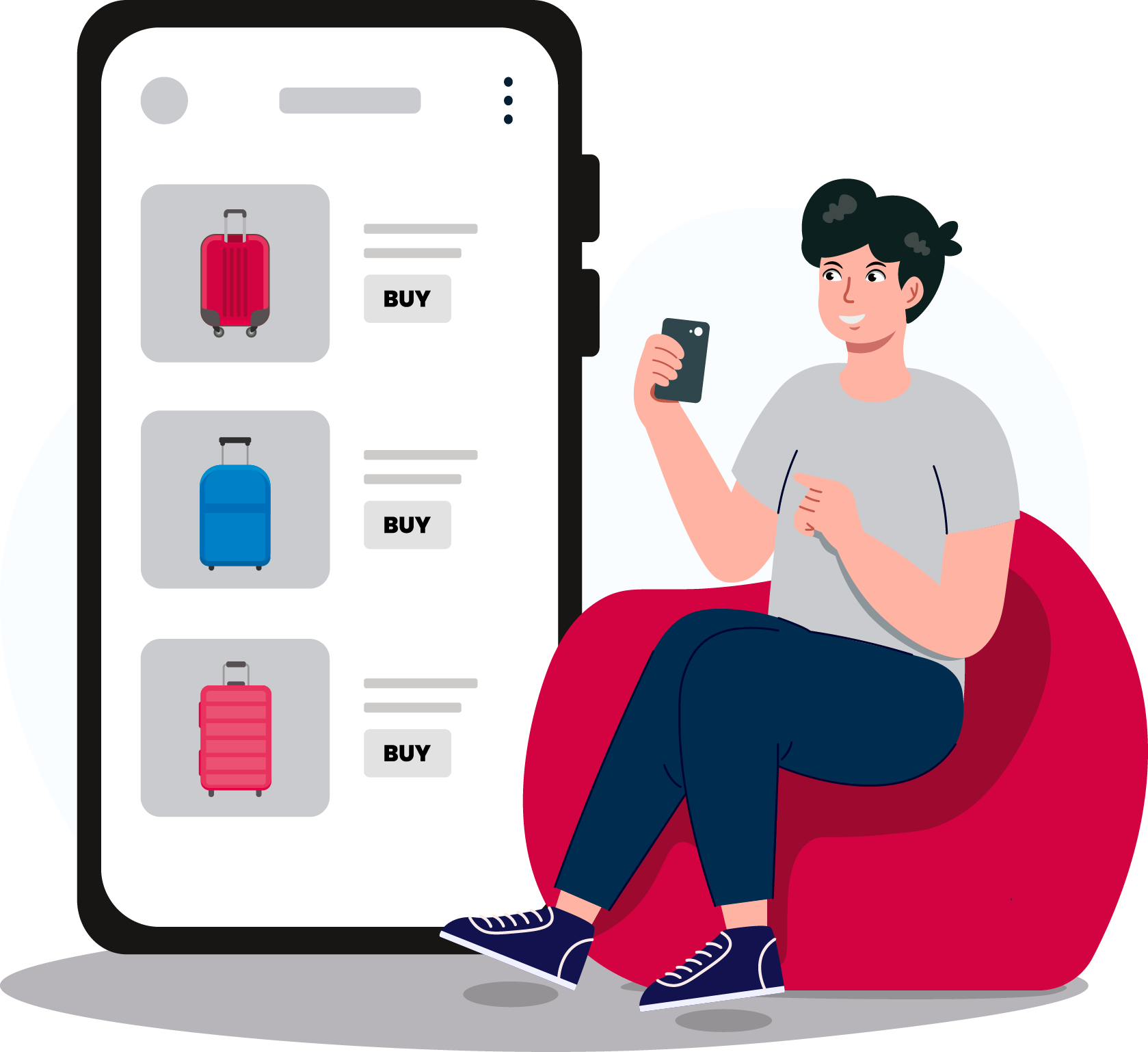Improve Your E-commerce Merchandizing
Easy Ways to Improve Your E-commerce Merchandizing
When online shoppers visit e-commerce sites, their shopping experience needs to be as user-friendly as possible. Online merchandising is key to turning browsers into customers, increasing sales and enhancing the retail customer experience.
The luggage and travel goods industry is extremely competitive, so it is vital to create a smooth customer journey.
Good e-commerce merchandising can also reduce the need for pre-and post-sales customer service. Customer satisfaction makes it a smart investment for brands.

1. Effective Product Descriptions
First, online retailers should focus on clear and engaging product descriptions. These descriptions help customers understand exactly what they're buying and why it suits their needs.
Unlike shopping in a physical store, online shoppers rely heavily on accurate and detailed information.
Consumers need to know suitcase dimensions, weight, durability and features like built-in charging ports, wheels and handles. Recommended usage scenarios, such as weekend trips or international travel, are also helpful. This clarity enhances the shopping experience for customers and boosts search engine results (SERPs) by making them more relevant.
Travel duration filtering lets shoppers choose luggage based on how long their trip will be:
- Weekend
- Week
- Longer vacation (2 weeks)
Customers should also be able to narrow down their search by key features like:
- TSA locks
- Expandable luggage
- Charging ports
- Set of 3
Different travel categories help organize products by their purpose, making it easier for customers to find what they need:
- Business trips
- Family vacations
- Adventure travels
- Destination
- Wedding
Consider adding filters for:
- Colour
- Material
- Weight
- Airline regulations (e.g. low-cost airline compatible)
2. User-Generated Content
User-generated content (UGC), such as customer reviews and ratings, significantly boosts trust among consumers. With these reviews, the online store feels authentic and reliable. Real-life feedback helps potential buyers visualize how a suitcase meets their needs, leading customers to feel more confident in purchasing. Featuring UGC on product pages can enhance the customer shopping experience and drive conversions.

1. Customer Reviews & Ratings
- Encourage customers to interact and leave detailed reviews about the suitcase’s durability, size and features.
- Highlight top-rated suitcases on category pages to guide new buyers.
2. Photo & Video Submissions
- Allow customers to upload photos of their suitcases in use (e.g., at the airport, packed for a trip).
- Feature customer videos demonstrating suitcase capacity and ease of handling.
3. Q&A Section on Product Pages
- Let customers ask and answer questions about the suitcase’s features.
- Pin best responses to help new buyers.
4. Customer Travel Stories & Blog Features
- Invite customers to share their travel experiences using your suitcases in blog posts.
- Include UGC in email marketing to build community engagement.
5. Loyalty Program Reviews & Testimonials
- Reward loyal customers for leaving detailed reviews.
- Offer discounts for customers who submit high-quality images/videos.

3. Capitalizing on Consumer Urgency
Mid-year shopping events like Amazon Prime Day 2025 offer powerful insights into consumer behavior under economic pressure. This year, shoppers aren’t just looking for deals — they’re buying strategically in response to broader trade and pricing uncertainty.
A recent Tinuiti survey found:
- 45% of Prime members plan to buy now to avoid future tariff-driven price increases.
- 33% are holding out for deeper discounts.
- Nearly 25% made earlier purchases this year due to tariff concerns.
This kind of urgency can be a merchandising advantage when paired with the right tactics:
- Use price-related messaging: Highlight time-sensitive offers (“Avoid future price hikes”) and price-lock guarantees on product pages.
- Promote strategic bundles: Package goods that align with stock levels, such as family sets or weekend-to-long-haul combos.
- Prioritize mobile-first deals: Many urgent purchases happen on mobile. Optimize banners and quick-buy features for small screens.
- Feature urgency triggers on social: Since platforms like Facebook (47%) and Instagram (39%) are key to deal discovery, make sure limited-time offers or early access perks are visible and linked directly to product pages.
- Use personalized recommendations: When shoppers are in a “get it now” mindset, suggest complementary items to increase basket size.
This kind of purchasing climate isn’t just about Prime Day - it reflects a broader “act now” consumer mindset. Merchandisers that recognize and respond to this behavioral shift can drive conversion, build loyalty and position their brand as responsive to the moment.
4. Personalizing the Customer Experience
By analyzing previous purchase behaviors, browsing histories and cart abandonment patterns, a digital merchandiser can suggest relevant products that complement the customer's choice. For example, if someone selects a large suitcase, recommend related products such as luggage tags or packing cubes. This is a great opportunity to cross-sell or up-sell. Personalized product recommendations based on customer data increase engagement and improve the likelihood of repeat purchases.
5. Optimizing Search Results for Better Navigation
To streamline the browsing process, ensure that search results are intuitive and accurate. Implement smart filtering and sorting options so customers can easily narrow down products. Customers tend to search by size, color, brand, price or popularity. Clearly organized search results significantly enhance the online shopping experience and reduce frustration.
Improving product descriptions and metadata is important. Your product listings will appear in search results outside your site, for example, Google Shopping.
6. Bring the In-Store Experience Online
A 360° exploration feature creates interactive experiences, enabling customers to open compartments, extend handles and examine features from every angle.
Virtual packing demonstrations showcase how various clothing items and travel essentials fit into different luggage models. These tools mimic the in-store experience and help online shoppers feel more confident in their choices.

7. Efficient Inventory Management
Keeping on top of inventory management is crucial in e-commerce merchandizing. Showing accurate stock levels and estimated delivery times helps manage customer expectations and reduces cart abandonment. Integrating inventory management systems with your online store ensures real-time product availability and prevents overselling.
Highlighting fast-shipping options can be a strong incentive for online shoppers to complete their purchases.
Platforms like Salsify, ChannelAdvisor and Feedonomics can help you automate product data distribution, manage inventory, and ensure consistent branding across channels.
8. Social Media
Social media can play a vital role in digital merchandizing. Platforms like Instagram, Facebook and Pinterest allow brands to showcase their products in visually engaging ways. These platforms also run targeted marketing campaigns to attract potential buyers back to the e-commerce site.
Collaborating with influencers or using social proof can further enhance credibility and encourage customers to engage with your brand.

9. Mobile Optimization
With most online shoppers browsing and purchasing using mobile devices, ensuring your online store is mobile-optimized is critical. Responsive design, fast-loading pages and smooth checkout processes contribute to a smooth experience for customers. Mobile-friendly features such as one-click payments and autofill options will also increase sales.
Visual-first mobile design focuses on high-quality imagery that showcases both style and functionality on smaller screens. Product videos and swipeable photo galleries are especially effective.

10. Seamless Checkout Experience
A complex checkout process often leads to abandoned carts. To improve conversion rates, ensure the checkout process is quick and easy. Features such as guest checkout, multiple payment options and clear shipping costs can create a seamless experience for customers.
Additionally, offering free shipping thresholds encourages customers to add more items to their carts, increasing overall sales.
11. Resources for E-commerce Merchandizing
To elevate your merchandising strategy, consider exploring platforms and tools that help track performance, manage listings, and optimize content. Tools like Profitero provide analytics and insights to help you stay competitive in the online retail space.
By offering a personalized, intuitive and content-rich experience, brands in the travel goods industry can increase sales, deepen customer trust and stand out in a highly competitive market.
